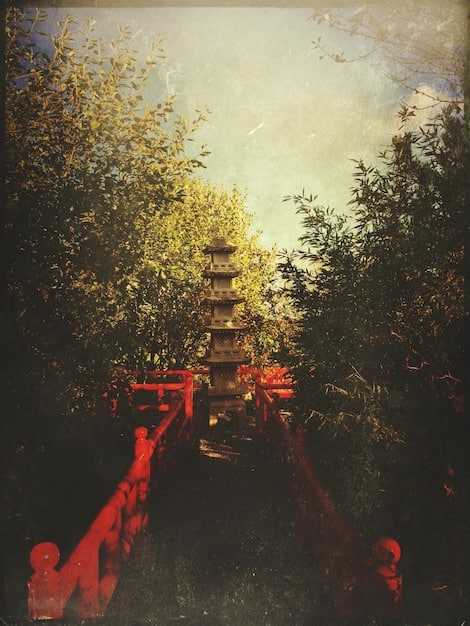Japanese Drama Genres: J-Horror, J-Romance, and More

Advertisements
Japanese drama genres encompass a diverse range of narratives, including **J-Horror**, known for its psychological and supernatural themes, and **J-Romance**, characterized by heartfelt stories and emotional depth, with many additional genres blending cultural elements and unique storytelling techniques.
Japanese dramas, or J-dramas, have captivated audiences worldwide with their unique storytelling, compelling characters, and diverse range of genres. From the chilling suspense of Japanese drama genres like J-Horror to the heartwarming stories of J-Romance, there’s a J-drama for every taste. Let’s dive into the fascinating world of J-drama genres and explore what makes each one special.
Anúncios
Japanese Drama: A Global Phenomenon
Japanese dramas have gained immense popularity outside of Japan, attracting viewers with their fresh perspectives and high production values. Whether you’re a fan of slice-of-life stories or intense thrillers, understanding the different genres can help you discover your next favorite show.
Each genre offers a distinct viewing experience, reflecting the rich tapestry of Japanese culture and society. From historical dramas to futuristic sci-fi, the options are endless.
Anúncios

The Rise of J-Drama in International Markets
The increasing availability of streaming services has played a significant role in J-drama’s global reach. Platforms like Netflix, Crunchyroll, and Viki offer a wide selection of J-dramas with subtitles, making them accessible to international audiences.
Subtitles are essential for viewers who don’t speak Japanese, ensuring they can fully understand and appreciate the nuances of the drama.
- Increased accessibility: Streaming services offer easy access to a vast library of J-dramas.
- Subtitles: Subtitles bridge the language barrier, allowing international viewers to enjoy J-dramas.
- Word-of-mouth: Positive reviews and recommendations from viewers contribute to the popularity of J-dramas.
In conclusion, the global appeal of J-dramas stems from their unique storytelling, diverse genres, and increased accessibility through streaming platforms.
Exploring J-Horror: Psychological and Supernatural Scares
J-Horror, short for Japanese horror, is a genre known for its emphasis on psychological horror and supernatural themes, often exploring the darker aspects of human nature. These dramas excel at creating suspense and unease through subtle cues and atmospheric settings.
Unlike Western horror, which often relies on gore and jump scares, J-Horror focuses on building tension and creating a sense of dread.

Key Elements of J-Horror
J-Horror distinguishes itself through its unique blend of elements that tap into primal fears and cultural beliefs. Central to the genre is the concept of yurei (ghosts) and yokai (supernatural creatures), often motivated by vengeance, lingering regrets, or unresolved ties to the mortal realm.
Traditional folklore and superstitions are woven into the narratives, enhancing the realism and impact of the story.
- Yurei and Yokai: These supernatural entities play central roles in J-Horror stories.
- Psychological tension: Emphasis is placed on building tension and creating a sense of unease.
- Atmospheric settings: Creepy old houses, abandoned schools, and dark forests are common settings.
- Subtle cues: J-Horror often uses sound effects, visual cues, and unnerving imagery to create scares.
In conclusion, J-Horror leverages psychological tension, supernatural elements, and atmospheric settings to create a uniquely terrifying experience.
The Allure of J-Romance: Heartfelt Stories and Emotional Depth
J-Romance dramas stand out for their ability to portray deep emotions and complex relationships. These dramas offer a refreshing take on love stories, often exploring themes of self-discovery and personal growth. If you’re looking for stories that tug at your heartstrings, J-Romance is the genre for you.
Unlike some Western romances, J-Romance dramas tend to focus on the emotional journey of the characters and the development of their bonds.
Hallmarks of J-Romance Dramas
J-Romance dramas often feature realistic characters dealing with relatable issues. The development of relationships is typically slow-paced, allowing viewers to become invested in the characters’ emotional journeys. There is often a thematic focus on societal issues, personal growth, and challenging stereotypes.
Common plot elements in J-Romance include misunderstandings, sacrifices, and the struggle to overcome obstacles.
- Realistic characters: J-Romance dramas often feature characters that viewers can relate to.
- Slow-paced development: Relationships develop gradually, allowing for deeper emotional connections.
- Emotional depth: J-Romance dramas explore the complexities of love and relationships.
In conclusion, J-Romance dramas attract viewers with their heartfelt stories, emotional depth, and focus on character development.
J-Crime: Detective Stories and Intriguing Mysteries
J-Crime dramas provide viewers with intricate detective stories and engrossing mysteries. These dramas frequently delve into the complexities of law and justice in Japan, exposing the moral ambiguities that investigators encounter while working to solve challenging cases.
The appeal of J-Crime lies in its capability to blend complex plotlines with intricate character development, resulting in a viewing experience that is both intellectual and emotionally resonant.
Essential elements of J-Crime Dramas
J-Crime dramas distinguish themselves from conventional detective series by delving into the intricate dimensions of the minds of perpetrators and victims alike. Viewers frequently follow the complex journeys of protagonists as they navigate through a maze of indications, subterfuge, and bureaucratic impediments to uncover the truth.
The dramas also function as mirrors to societal anxieties and issues, providing insightful commentary on the Japanese penal system, corporate malfeasance, and the psychological toll that illegal activity may have on those involved.
- Emphasis on Mystery: Keeping audiences guessing with each turning point, J-Crime relies on a complex plot.
- Moral Ambiguity: Discover the difficult dilemmas that investigators suffer while deciding between justice and integrity.
- Character Development: Get engrossed in the thoughts and motivations driving both the investigators and the offenders.
In summary, J-Crime dramas provide a potent mix of suspense, moral questioning, and thought-provoking narratives, captivating the hearts of viewers with their realistic depiction of criminal justice.
J-Comedy: Lighthearted Entertainment and Cultural Nuances
J-Comedy dramas offer lighthearted entertainment with a unique Japanese sensibility. These shows often blend humor with heartwarming moments, providing a refreshing escape from the stresses of everyday life. Many draw upon common societal conventions and exaggerate them for comedic effect.
One of the key draws of J-Comedy is its ability to incorporate cultural nuances into the comedy, giving international audiences insights into Japanese culture.
Distinctive Aspects of J-Comedy
J-Comedy dramas demonstrate a clear flair for comedic timing, frequently utilizing exaggerated gestures and facial expressions to maximize humor. These series provide distinctive cultural insights by introducing viewers to Japanese manners, speech idioms, and frequently absurd views on daily life.
These dramas frequently include characters who are endearing and relatable despite everything, enabling audience empathy and enhancing the lightheartedness.
- Exaggerated actions: J-Comedy frequently uses characters with exaggerated facial expressions and physical comedy to generate laughter.
- Cultural references: J-Comedy incorporates Japanese culture, traditions, and social norms into the humor.
- Relatable characters: J-Comedy characters are frequently flawed yet endearing, enabling audience members to connect with them.”
In summary, J-Comedy dramas give viewers a revitalizing break from their regular schedule by providing clever comedy, insightful cultural insights, and endearing characters.
J-Sci-Fi and Fantasy: Imaginative Worlds and Futuristic Visions
J-Sci-Fi and Fantasy dramas transport viewers to imaginative worlds filled with futuristic technology, supernatural powers, and fantastical creatures. These dramas often explore profound themes about humanity, technology, and the future of society. Immerse yourself in unique and engaging adventures.
Unlike Western sci-fi, which often focuses on space exploration and technology, J-Sci-Fi and Fantasy delves into the psychological and philosophical implications of these advancements.
Identifying Traits of J-Sci-Fi and Fantasy Dramas
J-Sci-Fi and Fantasy dramas distinguish themselves with sophisticated storytelling, breathtaking visual effects, and thought-provoking themes. Typical genre elements in these dramas include time travel, parallel universes, and the interaction between humans and sophisticated artificial intelligence.
Frequently drawing on Japanese folklore and mythology, these dramas combine time-honored stories with a contemporary perspective, providing an amalgamation of old and new.
- Futuristic Technology: J-Sci-Fi combines innovative technologies to create compelling worlds.
- Supernatural Abilities: A look at individuals with extraordinary skills and the consequences they have in society is common in fantasy stories.
- Philosophical Themes: Consideration of moral dilemmas such as ethics, consciousness, and the nature of reality is used by writers.
In summary, J-Sci-fi and Fantasy dramas fascinate audiences with their imaginative ideas, superb visuals, and consideration of existential issues, offering a distinctive perspective to the genre.
| Key Element | Brief Description |
|---|---|
| 👻 J-Horror | Focuses on psychological and supernatural themes. |
| 💖 J-Romance | Heartfelt stories with deep emotional depth. |
| 🕵️ J-Crime | Intricate detective stories and compelling mysteries. |
| 🤣 J-Comedy | Lighthearted entertainment with Japanese cultural nuances. |
Frequently Asked Questions
▼
J-Horror emphasizes psychological tension and utilizes supernatural elements such as yurei (ghosts) and yokai (supernatural creatures) to create scares, rather than relying on gore.
▼
Yes, J-Romance dramas often focus on the emotional journey of the characters and the development of their bonds. They also tend to be more subtle in their approach.
▼
J-Crime dramas frequently explore themes such as moral ambiguity, justice within complex situations, and delve into the thoughts and motivations of both investigators and offenders.
▼
J-Comedy often incorporates exaggerated actions, facial expressions, and references to Japanese culture, providing a humorous and culturally insightful viewing experience.
▼
These dramas combine futuristic technology or supernatural abilities with philosophical themes relating to the impact of these forces on individuals and their societies.
Conclusion
From the chilling depths of J-Horror to the heartwarming narratives of J-Romance, the world of Japanese drama genres offers something for every viewer. By understanding the unique elements of each genre, you can better appreciate the artistry and storytelling that makes J-dramas so compelling. So, grab some snacks, settle in, and get ready to explore the diverse landscape of Japanese dramas!





